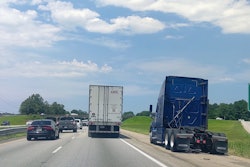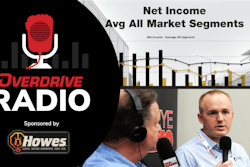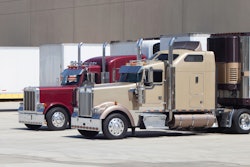It’s important to create a separate bank account that will be used to manage the income and expenses of your business. All income from your trucking business should be deposited there.
In addition, trucking expenses should be paid out of this account. In the event of an IRS audit, having personal finances mingled with your business could cost you thousands of dollars. In addition, it will be impossible for you and your accountant to analyze your business accurately if your personal finances are mixed in with those of your business.
Every month you should write a “distribution check” or make a direct transfer online from your operating account to your personal account as a “paycheck” to cover your personal living expenses -- if you're operating as an S Corp today, you're likely already doing this. If not, the target amount can be determined from the monthly personal and family cash requirements shown in your budget.
Estimated tax payments
Those who expect to owe at least $1,000 in tax after subtracting withholding and credits are required to make quarterly payments of self-employment taxes and federal and state income taxes. Though the IRS allows estimates based on the prior year’s data, owner-operator financial services provider ATBS uses current data to compute estimated taxes due.

Owner-operators can use the worksheet in IRS Form 1040-ES, or work with their accountant or business services provider, to figure estimated taxes.
If you make a late payment to the IRS, or no payment, it is authorized to apply penalties and interest based on the amount of tax due. Overdrive contributor and well-known owner-operator coach Gary Buchs notes the importance of setting aside money in a reserve account for tax liabilities. If you get behind on tax payments, those penalties and interest accrued can catch up to you quickly in a time like the present when falling revenues and rising costs make it difficult to save, let alone make the overdue payments.
A few years ago, presented with the situation of a younger owner-operator working out ways to better manage cash flow and dig his way out of high-interest credit card debt, that owner-operator wondered whether, at the end of the fourth quarter, he should use cash on hand to pay off his truck or to pay estimated quarterly taxes.
Buchs' fix was what he called "really a no-brainer: Pay the taxes" and eliminate the possibility of stiff penalties and interest. Being late in his truck loan term, too, that minimized the owners' potential interest savings there given the way truck loans, like mortgages, are structured to pay more principal, less interest, nearing the end of the term.
Keep a reserve account
Saving is not easy. It’s much harder, though, when you deny the inevitable. In addition to tax liabilities for any truly profitable operation, you well know your equipment will wear out. Smart owner-operators save for maintenance in proportion to miles run.
The best owner-operators hold between $5,000 and $10,000, and often multiples more, in reserve before they ever go into business. The purpose of the reserve account is to set aside money for large costs that could put a substantial drain on your operating cash, such as major maintenance items, tires, those quarterly estimated taxes, and insurance deductibles.
[Related: How owner-operators can avoid joining the 'capacity reduction' ranks]
Owners looking for additional business-planning and other management tips, among a myriad of other topics, can find more in the Overdrive/ATBS-coproduced "Partners in Business" manual for new and established owner-operators, a comprehensive guide to running a small trucking business. Click here to download the updated 2023 edition of the Partners in Business manual free of charge.










